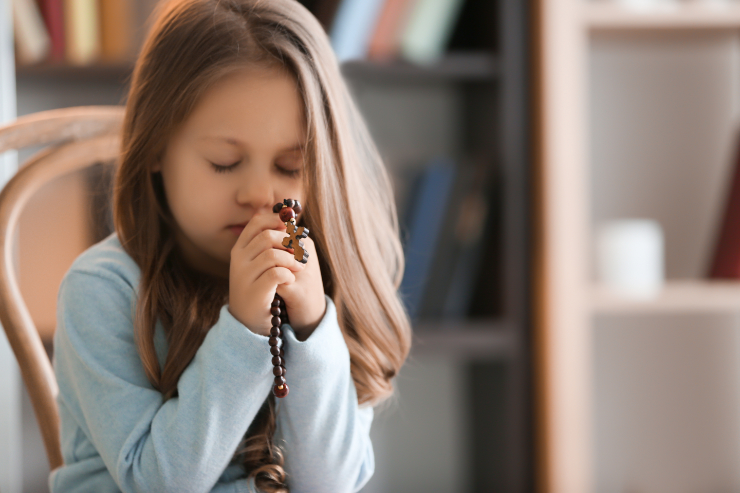
“Everything I have at this moment is a complete gift from God.”
There have been several studies on the way gratitude changes our attitude and even rewires our brain. It can relieve stress and anxiety and even increase dopamine production. Doesn’t this sound exactly what we need right now? And yet, precisely when we need it, the crosses and sufferings of life might leave you feeling less than grateful.
People are suffering right now, losing jobs and loved ones. We are struggling with physical illness and mental illness. The uncertainty and isolation are causing anguish and suffering. The secondary effects of this illness are destroying lives and peace. How can we be grateful when we seem to be losing so much?
At the same time, maybe this has been a time of healing for you. Perhaps it has brought into focus what wasn’t necessary in life. Priorities rose to the top. We may come out of this time with a renewed appreciation for family and friends. Maybe our feelings of entitlement have begun to disappear.
Before this, much of society was imbued with a sense that we were entitled to everything. Maybe I felt I deserved a big house, a brand new iPhone, and a big screen television because everyone else had one. I’m entitled to a six-figure job and three weeks of vacation. I’m entitled to success. I’m entitled to everything on my own terms and in my own time.
Has the last few months shown us the fleeting nature of these things?
We also lived in a society that took a lot for granted. Perhaps because we are told we’re entitled to so much, we don’t stop to realize that everything is a gift. I don’t deserve to write for this fantastic e-magazine, Integrated Catholic Life. Nor do I deserve the computer I’m using to type this post. I don’t even deserve to have functioning fingers with which to type! Everything I have at this moment is a complete gift from God. My life, my breath, my existence is possible because he loves me and freely gives me that love. I’ve done nothing to deserve it.
If we all lived with this reality in front of our eyes, don’t you think we would behave a little differently? Our actions, our conversations, and our relationships would be anointed with a graciousness and a humility that is often so lacking in today’s world. Like all the virtues, gratitude is something that needs to be cultivated.
Gratitude isn’t just the way we feel. It’s something we choose. It’s an act. So even in this strange time – indeed, because of this strange time – strive to choose gratitude.
We need to practice saying thank you. Our mothers probably tried to instill in us the good habit of writing thank you notes when we received presents. But do we still do it? If not, begin responding to gifts with a prompt little thank you note. It doesn’t have to be eloquent or fancy – just heartfelt. What about thank you notes for non-tangible gifts? Whether it’s a visit from a friend or a favor from a coworker, make an effort to show your gratitude, even if it’s not something Miss Manners would proscribe you need to do.
The more we say thank you, even just verbally, the more we’ll begin to recognize the gifts in our lives. I know a husband who does the dishes every night for his wife. Although now it’s just expected, what if she made an effort to verbally thank him for washing the dishes? It’s something that I’m sure we all could begin to take for granted, but if she goes out of her way to thank him, she’ll remember that his service is a gift of love to her. Likewise, his act of washing the dishes is itself a “thank you” for cooking dinner. But what if he goes out of his way to verbally thank her for dinner?
It’s hard to believe a relationship can’t be helped by these little acts of gratitude, and practicing them will help cultivate the virtue in our lives so that we can see acts of love everywhere.
We’ve all heard the expression “count your blessings,” but how often have you honestly sat down and done so? Once I received the task to do just that as my penance in the sacrament of confession. The priest pointed out that I had obviously taken the time to examine my conscience and count my sins, and now it was time to examine my life and count my blessings.
As I sat in the chapel, I started with the big, obvious blessings. My parents, siblings, nieces and nephews. Then my health and the health of my family. My friends, my job, my home. Being born Catholic and the grace of perseverance in the Faith. After working my way through the big list, I moved to smaller things, and then even to the blessings of that morning. Waking up in good health, making it to Mass and receiving Jesus in the Eucharist, being able to go to Confession. My car starting and safe travels to Mass. My breakfast that waited for me at the bagel shop, the people who made it for me… I finally looked at my watch and realized I needed to get to work. But there were so many blessings I hadn’t named and for which I hadn’t thanked God yet… where could I stop?
Unfortunately, it was when some of these things were taken away that we became acutely aware of them. Was I thankful for the opportunity to go to daily Mass before that opportunity was no longer there? Was I thankful for hugs and handshakes? Did I count the blessings of being able to hang out with friends, see coworkers every day, and simply interact with people without fear?
When we are able to do these things again, we will spend the first few weeks being grateful. Maybe soon after that, we’ll begin to take them for granted again. I hope we don’t.
Even during this time, God is showering you with abundant blessings. There are many gifts throughout your day – even those days that seem lonely and bleak.
Before you go to sleep tonight, stop and thank God for ten blessings in your life. They may be big or small, obvious or hidden. Thank him. Then tomorrow, make the effort to thank the people who cross your path (even from a “social distance”). Thank your spouse, your children, your parents, your friends for what they do for you or who they are for you. When we go back into society, thank your coworkers, thank the person who bags your groceries, thank your mailman, thank your waiter. Thank the priest who celebrated Mass or forgave your sins!
Practice saying thank you for the expected things, the mundane things, and the everyday things. The more we do this, the more we’ll begin to see even those gifts that are disguised. Some days you have many things for which to be thankful, and other days the gifts may be harder to see. Cultivate the gift of gratitude in your life, so that regardless of what comes into your life, you will be grateful for it.
Please share this article on Facebook and other social media.














